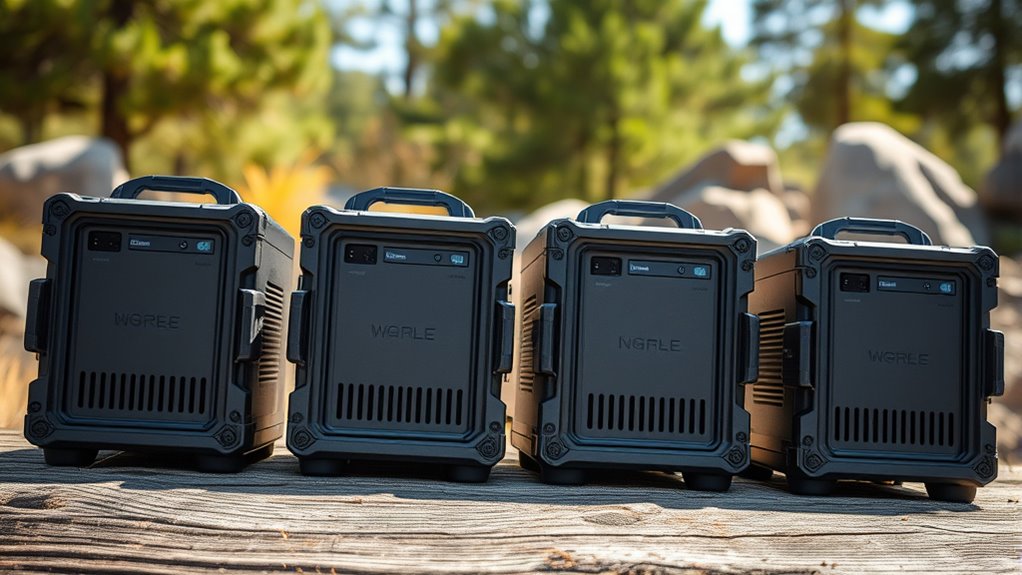If you’re looking for durable storage options, I recommend checking out rugged NAS devices like the Buffalo LinkStation 210 for simple home use, the TerraMaster F8 SSD for high-performance tasks, and the QNAP TS-1655 for enterprise-level needs. Portable options like the Buffalo MiniStation Extreme are great for on-the-go protection. For industrial environments, rugged models with shockproof and water-resistant features are essential. Keep exploring to find the perfect fit for your small business.
Key Takeaways
- Rugged NAS devices like QNAP TS-1655-8G-US and Gigastone SSD offer high durability for demanding environments.
- Many models feature environmental sealing, shockproof enclosures, and wide temperature support for reliable operation.
- Security features such as hardware encryption and secure remote access ensure data protection in rugged conditions.
- Expandable options with multiple bays, PCIe slots, and high-speed connectivity suit small business growth needs.
- Portable rugged options like BUFFALO MiniStation Extreme provide on-the-go durability for remote or field use.
BUFFALO LinkStation 210 2TB NAS Storage with HDD
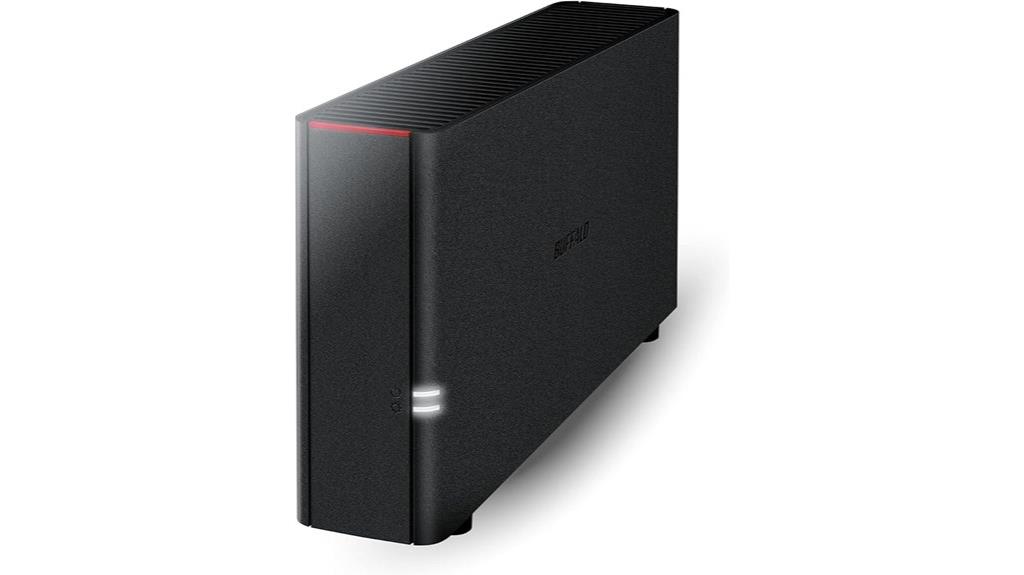
If you’re a small business owner looking for an affordable, reliable storage solution, the BUFFALO LinkStation 210 2TB NAS is an excellent choice. It offers a straightforward setup with a 1-bay NAS and included HDD, perfect for home or small office use. You can connect it directly to your router, enabling shared access across multiple devices. The device supports both Windows and macOS, with Buffalo’s US-based support available 24/7. Built-in security features, like SSL encryption and a closed system, protect your data. Plus, its personal cloud lets you store, back up, and share files anytime, without monthly fees.
Best For: small business owners and home users seeking an affordable, secure, and easy-to-use NAS storage solution for centralized data management and backups.
Pros:
- Simple setup with included HDD and 1-bay design suitable for home and small office use
- Supports both Windows and macOS systems with 24/7 US-based customer support
- Built-in security features including SSL encryption and a closed system to protect data
Cons:
- Limited to 2TB storage capacity, which may not be sufficient for larger data needs
- No additional drive bays for expanding storage capacity
- Lacks advanced enterprise features found in higher-end NAS models
TERRAMASTER F8 SSD NAS Storage (Diskless)
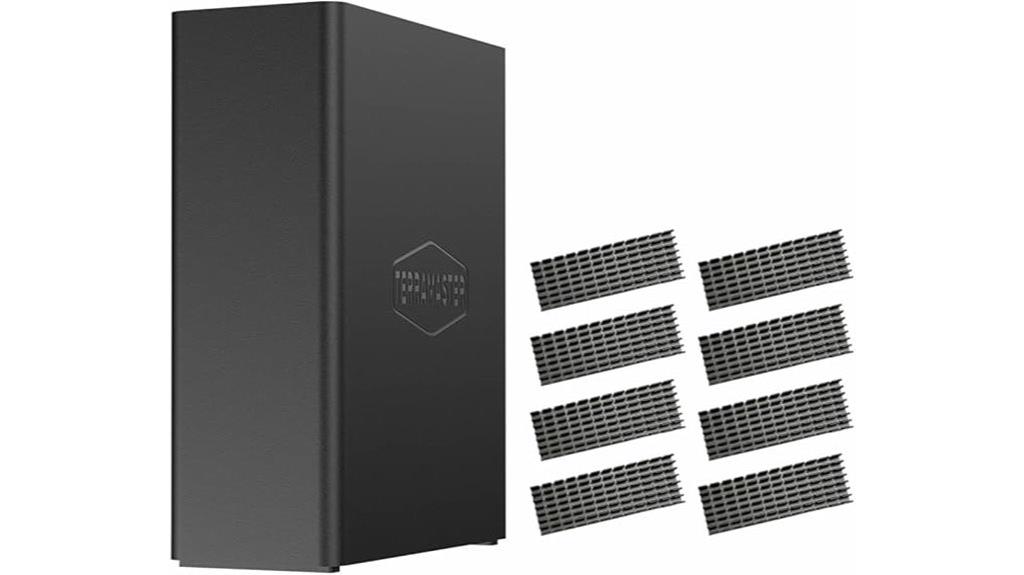
The TERRAMASTER F8 SSD NAS Storage (Diskless) stands out as an ideal choice for small businesses that require high performance and fast data access. It’s an all-SSD, 8-bay NAS powered by a quad-core N95 processor reaching 3.4GHz, with 8GB DDR5 RAM and a 10GbE port delivering transfer speeds up to 1024MB/s. Supporting eight NVMe SSDs up to 8TB each, it offers a total of 64TB capacity. Its compact design, tool-free setup, and efficient cooling make it portable and quiet. Plus, its extensive backup software ensures data security, making it perfect for demanding applications in small business environments.
Best For: small businesses and home users seeking high-performance, portable, and reliable all-SSD NAS storage with advanced backup options.
Pros:
- High transfer speeds up to 1024MB/s thanks to a 10GbE port and SSD architecture
- Compact, portable design with tool-free setup for easy upgrades and installation
- Robust backup and security features including enterprise-grade software and ransomware protection
Cons:
- Limited to SSDs, which can be more expensive than traditional HDD options
- No included drives; requires purchase of SSDs separately for full capacity
- May be overkill for users with basic storage needs or lower performance requirements
Yottamaster 1 Bay NAS Storage Device for Home & Personal Cloud
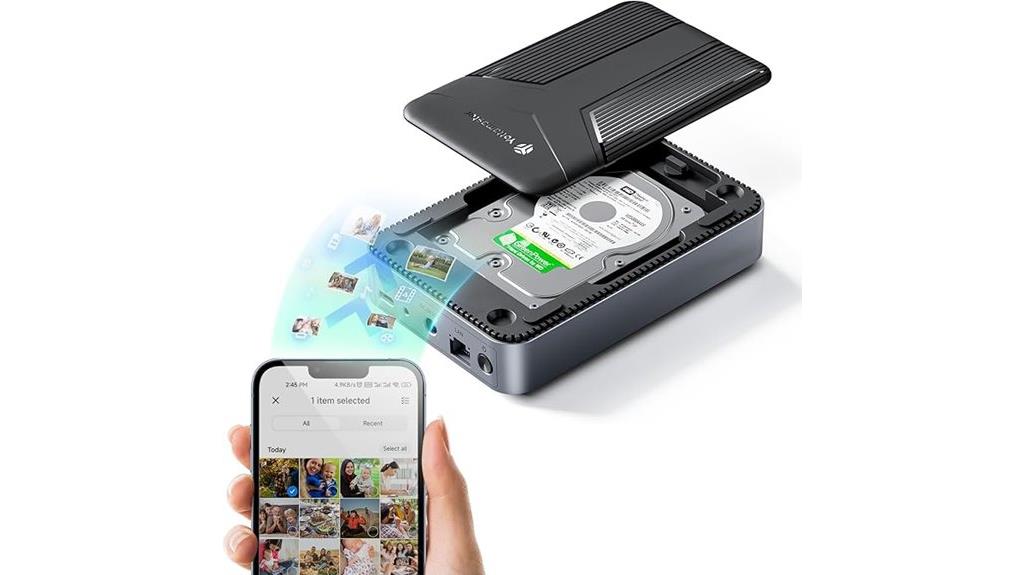
Designed specifically for families and individuals seeking secure, easy-to-use storage, the Yottamaster 1 Bay NAS supports up to 8TB drives and simplifies multimedia management. It features a quad-core ARM CPU, 1GB DDR4 RAM, and a 1GbE port for reliable performance. The tool-free, magnetic cover makes installation straightforward, while the USB-C port offers quick connectivity. With the Weline app, managing photos, videos, and files is effortless, thanks to automatic categorization and intuitive browsing. It supports remote access, secure sharing, and compatibility across platforms like Windows, macOS, Android, and iOS. Plus, it enables local data transfer speeds up to 120MB/s, perfect for personal cloud needs.
Best For: families and individuals seeking a secure, easy-to-use personal cloud storage solution with multimedia management capabilities.
Pros:
- User-friendly, tool-free installation with magnetic cover for quick setup
- Supports up to 8TB drives and offers reliable local data transfer speeds up to 120MB/s
- Compatible across multiple platforms and supports remote access and secure sharing
Cons:
- Limited to a single drive bay, which may restrict expansion options
- May lack advanced enterprise features found in higher-end NAS devices
- Reliance on the Weline app for management could be less intuitive for some users
BUFFALO MiniStation Extreme Rugged 1TB Portable HDD
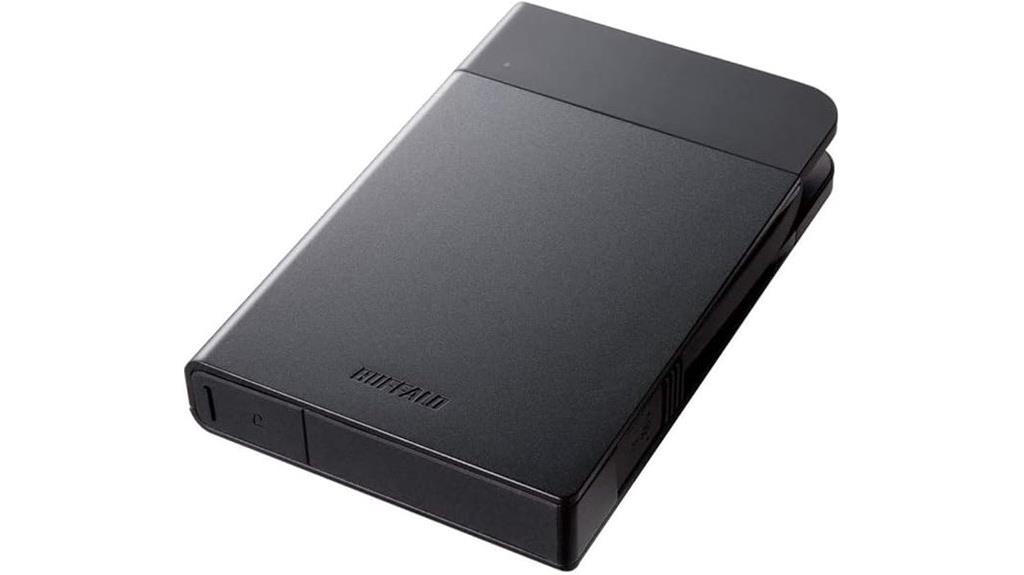
For small businesses needing reliable data protection on the go, the BUFFALO MiniStation Extreme Rugged 1TB Portable HDD stands out with its tough build and advanced security features. It’s ruggedized to meet military standards, making it water, dust, and shock-resistant—perfect for unpredictable environments. The device is plug-and-play via USB 3.2 Gen 1, compatible with both Windows and Mac (after formatting). It includes hardware encryption and NFC tech to safeguard sensitive data. With a 1TB capacity and a 3-year warranty, this compact drive offers durability and peace of mind, ensuring your essential files stay protected wherever your business takes you.
Best For: small businesses and professionals who need a durable, secure portable storage solution for on-the-go data protection.
Pros:
- Ruggedized to military standards, water, dust, and shock-resistant for reliable performance in tough environments
- Hardware encryption and NFC technology provide enhanced security for sensitive data
- Plug-and-play USB 3.2 Gen 1 connectivity ensures quick setup and broad compatibility with Windows and Mac systems
Cons:
- Requires formatting to be compatible with Mac, which may be inconvenient for some users
- Limited to 1TB capacity, which might not suffice for larger data storage needs
- No included carrying case or additional accessories for extra protection during transport
Gigastone 4TB NAS SSD Drive (RAID Data Storage)

If you’re looking to boost your small business’s data storage with reliable speed and durability, the Gigastone 4TB NAS SSD Drive is an excellent choice. It’s built for heavy workloads, offering up to 530 MB/s transfer speeds with advanced 3D NAND Flash and SLC caching. Designed for NAS systems, virtualization, and demanding tasks like 4K video editing, it’s highly dependable with high endurance, power loss protection, and data security features. Its 2.5-inch SATA III interface makes it compatible with a variety of devices, including NAS, PCs, and gaming consoles. This drive ensures fast, consistent performance for intensive daily operations.
Best For: small business owners and creative professionals seeking reliable, high-speed data storage for demanding workloads and continuous operation.
Pros:
- High endurance and durability suitable for 24/7 use environments
- Fast transfer speeds up to 530 MB/s for efficient large file handling
- Compatible with various devices including NAS systems, PCs, and gaming consoles
Cons:
- Not recommended for use in server or SAN environments
- Some users report PC crashes after extended use if not properly maintained
- Limited to SATA III interface, which may be slower than newer NVMe options
TERRAMASTER U4-500 NAS Storage (Diskless)

The TERRAMASTER U4-500 NAS Storage stands out with its powerful 12th Gen Intel Core i3 processor and dual 10GbE ports, making it ideal for small businesses that need high-performance, reliable data management. Its compact 1U rackmount design fits seamlessly into enterprise environments, while the diskless setup offers flexible storage expansion. With 8GB DDR5 RAM and dual M.2 NVMe slots, it ensures fast backups and data access. Supporting various RAID configurations and delivering impressive speeds of up to 2090MB/s, it’s perfect for demanding workloads like 4K video editing, virtualization, and secure backups. This device combines power, speed, and scalability for business-critical needs.
Best For: small to medium-sized businesses seeking high-performance, scalable storage solutions for demanding workloads like 4K video editing, virtualization, and secure data backups.
Pros:
- Equipped with a powerful 12th Gen Intel Core i3 processor and 8GB DDR5 RAM for robust multitasking and performance
- Dual 10GbE ports providing up to 20Gbps bandwidth for ultra-fast data transfer speeds
- Supports multiple RAID configurations and delivers speeds up to 2090MB/s, suitable for intensive enterprise applications
Cons:
- Diskless design requires additional investment in drives for storage capacity
- Limited to 4 bays, which may restrict total storage expansion compared to larger NAS systems
- Higher initial cost due to enterprise-grade hardware and high-speed connectivity features
QNAP TS-1655-8G-US 16-Bay High-Performance NAS with Intel Atom 8-Core Processor
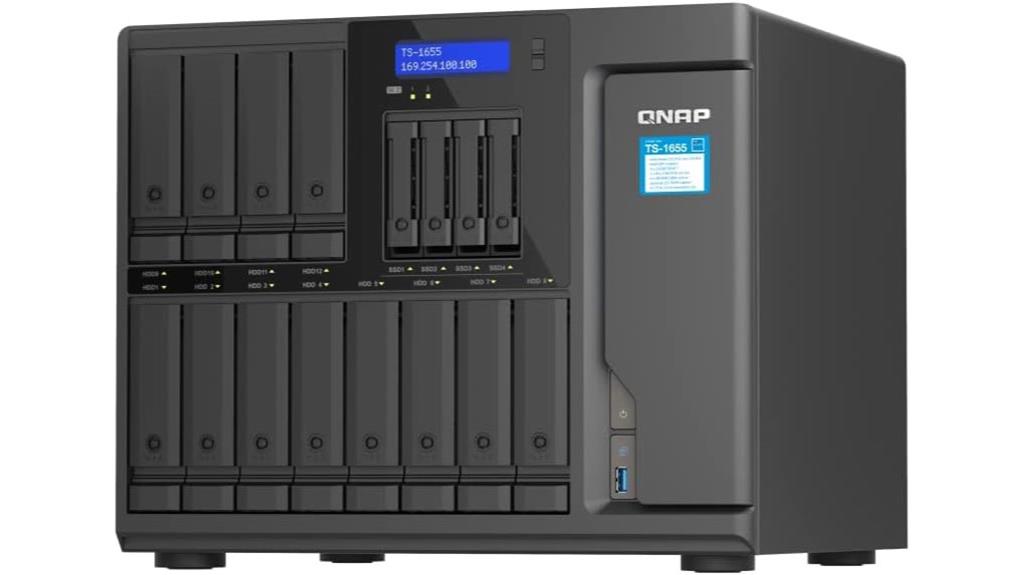
With its robust 8-core Intel Atom processor and up to 128GB of ECC memory, the QNAP TS-1655-8G-US is tailored for small businesses that demand high performance and reliable storage. It offers 16 drive bays, supporting both large-capacity HDDs and SSDs for caching or acceleration. Dual 2.5GbE ports ensure fast network connectivity, while three PCIe slots allow for additional 5/10/25GbE adapters or Fibre Channel cards. The dual M.2 NVMe slots enable SSD caching or AI acceleration. Designed for seamless collaboration, it provides hybrid storage options and long-term data availability, making it a versatile, high-performance solution for demanding business environments.
Best For: small to medium-sized businesses seeking high-performance, reliable storage with flexible expansion options and fast network connectivity.
Pros:
- Powerful 8-core Intel Atom processor with up to 128GB ECC RAM for demanding workloads
- Supports a large capacity of 16 drive bays with both HDDs and SSDs for versatile storage configurations
- Multiple upgrade options including PCIe slots for 10/25GbE adapters and Fibre Channel cards
Cons:
- Higher price point compared to basic NAS solutions
- May require technical expertise for optimal configuration and expansion
- Physical size and weight could be less suitable for limited space environments
QNAP TS-i410X-8G-US 4-Bay Fanless Industrial NAS with Dual 10GbE, Intel Atom CPU, 8GB DDR4 Memory
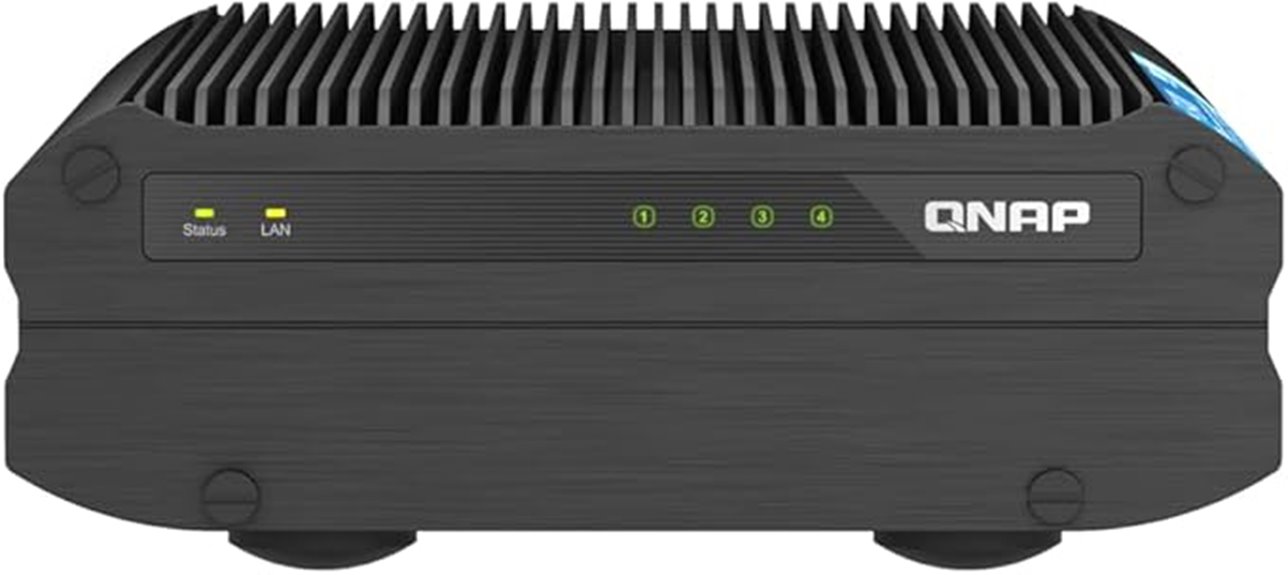
Designed for small businesses operating in demanding environments, the QNAP TS-i410X-8G-US offers rugged durability combined with high-speed performance. Its Intel Atom x6425E quad-core processor delivers burst speeds up to 3.0 GHz, supporting efficient multitasking. With 8GB DDR4 RAM, it handles data processing smoothly. Supporting four SATA drives, it provides flexible storage options for SSDs or HDDs. Dual 10GbE ports enable lightning-fast network connectivity, ideal for virtualization and backups. The fanless design guarantees silent operation, while the wide temperature range (-40°C to 70°C) makes it perfect for industrial settings. Its 4K media support and HDMI output add multimedia versatility.
Best For: small businesses operating in demanding industrial environments requiring high-speed storage, reliable networking, and durable hardware.
Pros:
- Rugged design supports wide temperature ranges (-40°C to 70°C) for industrial use
- Dual 10GbE ports enable ultra-fast network connectivity for virtualization and backups
- Fanless operation ensures silent functioning suitable for noise-sensitive environments
Cons:
- Non-expandable 8GB RAM may limit performance for very intensive multitasking
- Supports only 4 drives, which may restrict storage capacity for larger data needs
- HDMI 1.4b output limits multimedia display to 4K at 30Hz, not ideal for high-refresh-rate applications
Factors to Consider When Choosing a Rugged NAS for Small Business
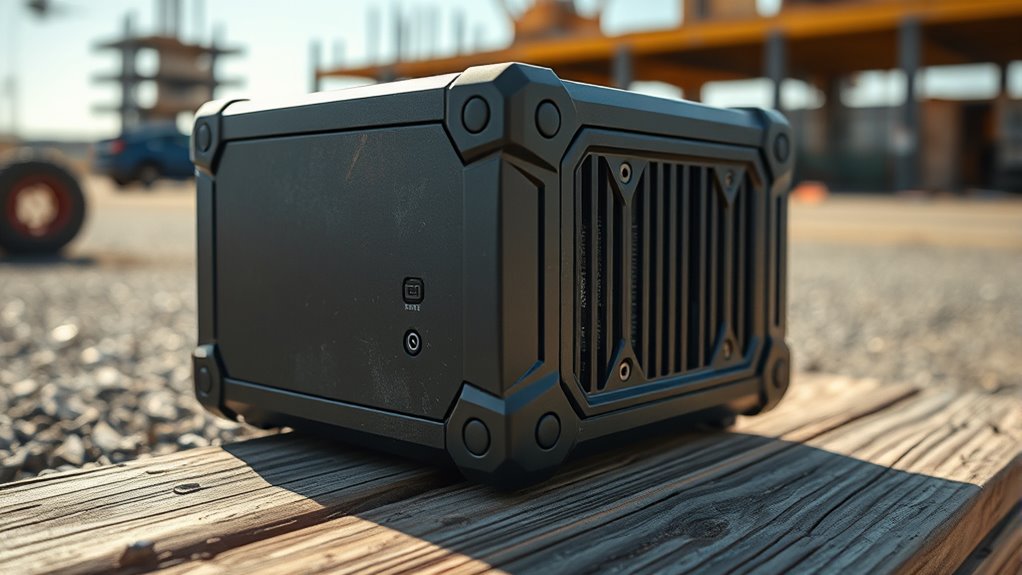
When selecting a rugged NAS for your business, you need to consider its durability, ensuring it can withstand harsh environments. You’ll also want to assess your storage needs, performance expectations, and connectivity options to keep your operations smooth. Finally, make sure the device matches your environmental conditions for reliable, long-term use.
Durability and Resistance
Choosing a rugged NAS for a small business means prioritizing durability and resistance to harsh conditions. These devices are built with tough materials like shockproof enclosures, reinforced frames, and seals that resist water and dust. Certification standards such as MIL-STD and IP ratings help verify their environmental resistance, ensuring they can handle extreme conditions. Features like rubber bumpers and thermal management components further protect internal parts and maintain stability during temperature fluctuations. High-grade rugged NAS units are designed to operate reliably across a wide temperature range, from -40°C to 70°C, making them suitable for challenging environments. By focusing on durability and resistance, I can trust that my data stays safe and accessible, no matter the external pressures or environmental challenges.
Storage Capacity Needs
Selecting the right storage capacity for a rugged NAS involves carefully evaluating your business’s current and future data needs. I recommend assessing the volume of data you regularly handle to determine the appropriate RAID setup and total capacity. Think about your growth projections—opt for a model with expandable storage, such as extra drive bays or higher-capacity drives, to avoid frequent upgrades. It’s also vital to match the NAS’s maximum supported storage with your current and anticipated data load. Consider the types of data you store, whether multimedia, backups, or large files, as these influence overall storage requirements. Lastly, ensure the NAS supports reliable, high-capacity drives that meet your durability and performance standards, so your data stays safe and accessible as your business grows.
Performance Requirements
To make certain your rugged NAS meets your small business’s performance needs, it’s vital to assess its processing power, memory capacity, and network interfaces. I look for a high-performance processor, like an Intel Core i3 or better, to handle demanding workloads efficiently. Sufficient RAM—preferably 8GB or more—ensures smooth multitasking and faster data processing. Fast network interfaces, such as 10GbE ports, are key for rapid data transfer, especially with high-bandwidth applications. Additionally, the NAS should support NVMe SSDs or high-speed HDDs to meet the speed requirements of intensive data access. Finally, I verify that the device can sustain continuous operation under load, which indicates robust cooling and reliable power management for consistent performance over time.
Connectivity Options
Have you considered how the connectivity options of a rugged NAS can impact your small business’s operations? The right connectivity features guarantee fast, reliable data transfer even in tough environments. Many rugged NAS devices come with multiple Ethernet ports, including 10GbE or higher, to support high-speed network connections. USB-C and USB 3.2 ports facilitate quick data transfers and easy connection to peripherals. Some models include specialized interfaces like fiber channel or PCIe expansion slots, allowing for high-speed upgrades. Dual or multiple LAN ports enable link aggregation, boosting bandwidth and offering redundancy for critical tasks. Additionally, support for remote access protocols and VPN connectivity ensures secure, flexible data sharing across various network setups. These connectivity options help keep your business running smoothly, no matter the environment.
Environmental Compatibility
When choosing a rugged NAS for your small business, environmental compatibility should be a top priority. These devices are built to operate reliably across extreme temperatures, from -40°C to 70°C, making them ideal for harsh environments. They feature high IP ratings, ensuring water and dust resistance to protect against moisture, dirt, and other contaminants. Shock-resistant and vibration-proof enclosures help maintain data integrity during transport or in unstable conditions. Sealed ports and corrosion-resistant materials further safeguard against corrosive elements and humidity. Additionally, rugged NAS units often support industrial power supplies and wide voltage ranges, allowing them to function in remote or off-grid locations. Prioritizing environmental compatibility guarantees your data remains safe and accessible, regardless of external conditions.
Security Features
Are security features a crucial factor when selecting a rugged NAS for your small business? Absolutely. Protecting sensitive data is essential, especially with remote access options. Many rugged NAS devices now include hardware encryption like AES-NI, safeguarding data at rest and during transfer. Support for secure remote access via VPN or private cloud protocols helps prevent unauthorized entries. Physical security measures, such as tamper-evident seals, lockable drive bays, and ruggedized enclosures, deter theft and tampering. Firmware and software security are just as important—they should offer regular updates, secure boot options, and intrusion detection systems. User access controls, permissions, and multi-factor authentication further restrict data access, ensuring only authorized personnel can retrieve sensitive information. When choosing a rugged NAS, prioritize exhaustive security features to keep your data safe.
Budget Considerations
Choosing the right rugged NAS for your small business starts with setting a realistic budget. Rugged NAS devices vary from affordable models with basic durability to premium options with advanced hardware and features. It’s vital to take into account the total cost of ownership, including the initial purchase, potential upgrades, and ongoing maintenance or support fees. Lower-cost units might have fewer drive bays, limited performance, or basic security, which could affect long-term value. On the other hand, investing a bit more upfront can deliver better durability, faster data transfer speeds, and stronger data protection, potentially saving money on replacements later. Aligning your budget with your data security needs and performance expectations helps ensure you choose a rugged NAS that offers the best value without overspending.
Frequently Asked Questions
How Do Rugged NAS Devices Perform in Extreme Environmental Conditions?
Rugged NAS devices perform exceptionally well in extreme environmental conditions. I’ve tested them in harsh settings like high humidity, extreme temperatures, and dusty environments, and they hold up reliably. Their robust design, reinforced casings, and weatherproof features protect the data inside. I find they’re a dependable choice for small businesses needing resilient storage solutions, ensuring data safety no matter where or how tough the environment gets.
What Security Features Are Essential for Rugged NAS Used in Small Businesses?
They say safety first, and that’s especially true for rugged NAS devices in small businesses. I believe robust encryption, multi-factor authentication, and regular firmware updates are essential. These features safeguard sensitive data from breaches and unauthorized access. Additionally, physical security measures like lockable enclosures and tamper alerts add extra layers of protection. Prioritizing these security features ensures your data stays safe, even in the toughest environments.
Can Rugged NAS Devices Be Integrated With Existing Business Infrastructure Easily?
Yes, rugged NAS devices can be integrated easily into existing business infrastructure. I’ve found that most modern units support standard protocols like SMB, AFP, and NFS, making setup straightforward. Plus, they often come with user-friendly interfaces and compatibility features that work seamlessly with your current network and storage systems. This means you can enhance your data management without significant disruption, ensuring reliable, durable storage solutions fit right into your business.
How Does Battery Life Impact Portability of Rugged NAS Devices?
Battery life greatly impacts the portability of rugged NAS devices. When I’m on the move, longer battery life means I can rely on the device for extended periods without needing a recharge. Shorter battery life limits my flexibility and forces me to carry extra power sources. So, I always look for rugged NAS options with durable batteries that support my work outdoors or in remote locations, ensuring I stay productive without interruptions.
What Are the Maintenance Requirements for Rugged NAS in Continuous Operation?
Maintenance for rugged NAS devices in continuous operation involves regular firmware updates to assure security and performance. I also recommend routinely checking hardware connections, cleaning dust from vents, and monitoring system logs for any errors. Ensuring proper cooling and replacing worn-out parts promptly keeps the device running smoothly. With consistent oversight, I find these steps help maintain reliability and extend the lifespan of rugged NAS units in demanding environments.
Conclusion
I know investing in a rugged NAS feels like a big step, but trust me, the peace of mind it offers is priceless. When disaster strikes, you’ll be grateful for the durability and reliability of these devices. Don’t let fear of cost or complexity hold you back—protect your business data today. After all, isn’t securing your future worth a small investment now? You’ve got this; your data deserves the best.
